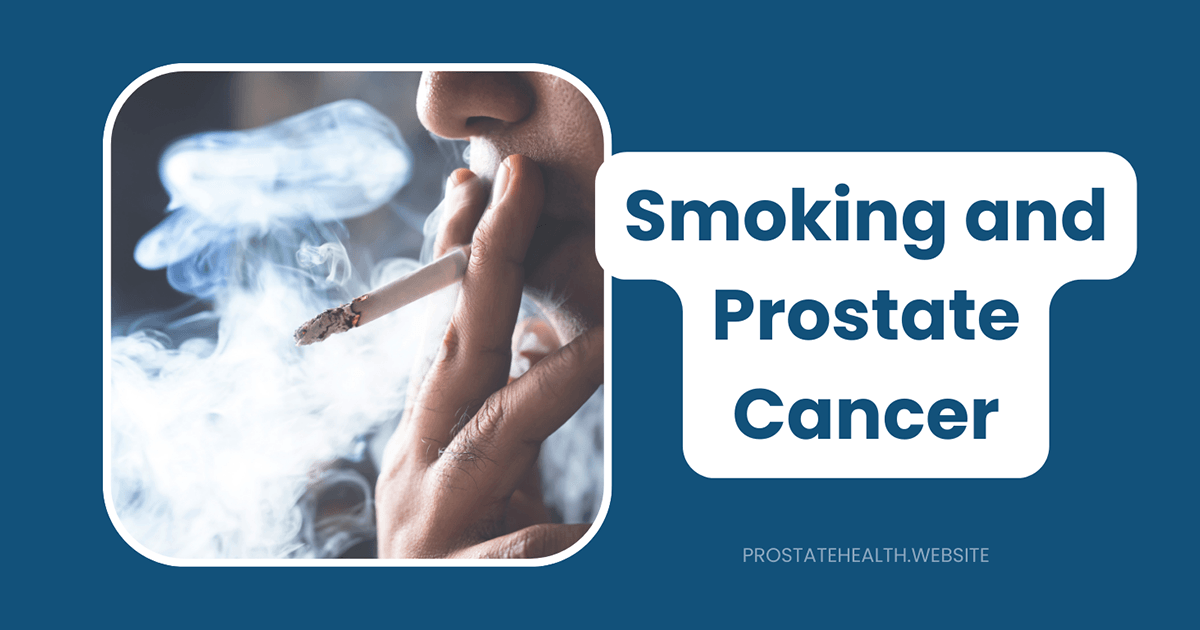Smoking and Prostate Cancer: Another Reason to Quit

When James, a 62-year-old construction manager and longtime smoker, was diagnosed with aggressive prostate cancer, his oncologist delivered a sobering message: “Your smoking habit isn’t just affecting your lungs—it’s likely making your prostate cancer more aggressive and harder to treat.”
Like many men, James was surprised by this connection. “I knew smoking caused lung cancer,” he admits, “but I had no idea it could affect my prostate cancer too.”
The relationship between smoking and prostate cancer is nuanced and often misunderstood. While research on whether smoking increases your initial risk of developing prostate cancer shows mixed results, the evidence is much clearer when it comes to cancer aggressiveness, treatment outcomes, and survival rates.
This comprehensive guide explores what science tells us about smoking and prostate cancer, offering evidence-based insights that might provide yet another compelling reason to quit.
Understanding the Evidence: Does Smoking Cause Prostate Cancer?
The question of whether smoking increases your risk of developing prostate cancer in the first place has produced somewhat conflicting research:
The Incidence Paradox
Interestingly, some studies have found that current smokers might actually have a slightly lower risk of being diagnosed with prostate cancer, particularly non-aggressive forms. A large cohort study published in PMC found that “current smokers had a decreased risk of nonadvanced prostate cancer (HR=0.82) compared to never smokers.”
Several theories might explain this counterintuitive finding:
- Screening disparities: Smokers tend to have lower rates of prostate cancer screening, potentially leading to fewer diagnoses of early-stage cancers
- Hormonal effects: Smoking may alter hormone levels in ways that temporarily mask early prostate cancer development
- Competing mortality: Smokers may die from other causes before prostate cancer is diagnosed
However, this apparent “protective effect” disappears when looking at more serious forms of the disease.
The Mortality Reality
When it comes to fatal prostate cancer, the evidence points clearly in the other direction. The same cohort study found that “current smokers had an increased risk of fatal prostate cancer (HR=1.69)” compared to never smokers.
A meta-analysis of 24 cohort studies involving over 21,000 prostate cancer cases concluded that “current smokers have an increased risk of fatal prostate cancer with RR = 1.14,” and “the heaviest smokers have a 24% to 30% greater risk of death from prostate cancer compared to nonsmokers.”
This suggests that while smoking might not significantly increase your risk of developing prostate cancer initially, it substantially increases your risk of dying from it if you do develop the disease.
The Aggression Connection: How Smoking Makes Prostate Cancer Worse
Perhaps the most concerning aspect of the smoking-prostate cancer relationship is how tobacco use affects cancer aggressiveness and progression:
Increased Aggressiveness
Recent research has found strong links between smoking and more aggressive forms of prostate cancer:
- A 2024 study published in Springer Link found that “current smokers have an odds ratio (OR) of 1.99 for high-aggressive prostate cancer compared to never smokers.” This means current smokers are nearly twice as likely to develop aggressive forms of the disease.
- The effect is even more pronounced in African American men, with the same study finding that “African American current smokers have an OR of 3.58 for high-aggressive prostate cancer compared to African American never smokers”—meaning their risk is more than three and a half times higher.
- According to Medical News Today, “in people diagnosed with prostate cancer, smoking is associated with more aggressive cancer.”
Poorer Treatment Outcomes
Smoking also appears to reduce the effectiveness of prostate cancer treatments:
- Research shows that smokers have higher rates of biochemical recurrence (rising PSA levels after treatment) compared to non-smokers
- Radiation therapy may be less effective in smokers
- Surgical complications are more common in smokers undergoing prostatectomy
Increased Metastasis Risk
Perhaps most alarmingly, smoking increases the likelihood that prostate cancer will spread beyond the prostate:
- Studies have found that smokers have a higher risk of metastatic disease
- The risk of cancer spreading appears to increase with smoking intensity (cigarettes per day) and duration
Dr. Sarah Johnson, oncologist at University Medical Center, explains: “We see consistently worse outcomes in our prostate cancer patients who smoke. The cancer tends to be more aggressive, treatments less effective, and the risk of the cancer spreading is significantly higher.”
The Mechanisms: How Smoking Affects Prostate Cancer
Several biological mechanisms help explain how smoking influences prostate cancer development and progression:
1. Carcinogen Exposure
Cigarette smoke contains over 7,000 chemicals, including at least 70 known carcinogens that can damage DNA and promote cancer:
- Polycyclic aromatic hydrocarbons (PAHs): These compounds can cause DNA mutations and activate cancer-promoting genes
- Nitrosamines: These chemicals can damage DNA in ways that lead to cancer development
- Heterocyclic aromatic amines: These compounds can cause genetic damage in prostate tissue
2. Cadmium Toxicity
Cadmium, a toxic heavy metal found in cigarette smoke, appears to play a particularly important role in prostate cancer:
- According to a study published in PMC, “cadmium reaches the prostate through the bloodstream after being inhaled” and “alters the expression of genes such as EDN1 and HMOX1, leading to abnormal protein activities and apoptosis”
- Cadmium has been shown to activate the androgen receptor in prostate cancer cells, potentially accelerating cancer growth
- Research indicates that cadmium exposure “leads to oxidative stress, which is associated with genetic damage in prostate cells”
3. Chronic Inflammation
Smoking promotes chronic inflammation throughout the body, including in the prostate:
- Studies show that “smokers exhibit more inflammation within the prostate compared to nonsmokers,” according to European Urology Focus
- This inflammation creates an environment rich in pro-inflammatory cytokines and growth factors that can promote cancer progression
- Chronic inflammation is increasingly recognized as a key driver of prostate cancer aggressiveness
4. Hormonal Disruption
Smoking affects hormone levels in ways that may influence prostate cancer:
- Male smokers tend to have higher levels of testosterone, androstenedione, and dihydrotestosterone compared to non-smokers
- These hormonal changes may fuel the growth of hormone-sensitive prostate cancers
- Smoking also affects estrogen metabolism, potentially creating a more cancer-promoting hormonal environment
5. Immune System Impairment
Smoking weakens the immune system’s ability to fight cancer:
- Natural killer cells, which help identify and destroy cancer cells, function less effectively in smokers
- The body’s ability to recognize and eliminate abnormal prostate cells is compromised
- Immune surveillance, a critical defense against cancer development, is impaired
6. Angiogenesis Promotion
Smoking may enhance the formation of new blood vessels that feed tumors:
- Research has found that smoking increases expression of heme oxygenase 1 (HO-1) in prostate cancer cells
- HO-1 plays a role in tumor angiogenesis—the formation of new blood vessels that supply tumors with nutrients
- Better blood supply allows tumors to grow larger and potentially spread more easily
The Racial Disparity: Why Smoking May Be Even More Dangerous for Some Men
The impact of smoking on prostate cancer isn’t uniform across all populations. Recent research has uncovered concerning disparities:
African American Men Face Higher Risks
The 2024 study in Springer Link found that smoking has a disproportionate impact on African American men:
- African American current smokers have 3.58 times higher odds of developing high-aggressive prostate cancer compared to African American non-smokers
- Even former smokers who are African American have 2.21 times higher odds of aggressive disease
- These risks are substantially higher than those observed in European American men
This disparity is particularly concerning given that:
- African American men already have a higher prostate cancer incidence rate (176.2 per 100,000 men compared to 103.5 for European American men)
- The mortality rate for African American men due to prostate cancer is more than double that of European American men (37.5 vs. 17.8 per 100,000)
Potential Factors Behind the Disparity
Several factors may contribute to these disparities:
- Smoking patterns: The study found that 22% of African American participants were current smokers compared to 9.2% of European American participants
- Menthol cigarette use: Approximately 85% of African American smokers use menthol cigarettes, compared to 30% of European American smokers
- Biological differences: African American smokers showed higher cotinine levels (a marker of nicotine exposure) despite smoking fewer cigarettes per day
- Healthcare access: Disparities in healthcare access and quality may compound the effects of smoking
Dr. William Thompson, lead author of the study, notes: “These findings highlight the urgent need for targeted smoking cessation programs for African American men, particularly those with or at risk for prostate cancer.”
Quitting Smoking: Benefits for Prostate Health
The good news is that quitting smoking appears to provide significant benefits for prostate health:
Reduced Risk of Aggressive Disease
- Former smokers generally have lower risks of aggressive and fatal prostate cancer compared to current smokers
- The longer the time since quitting, the greater the reduction in risk
Improved Treatment Outcomes
- Studies show that men who quit smoking before prostate cancer treatment have better response rates
- Surgical complications are reduced in those who quit before prostatectomy
- Radiation therapy appears more effective in former smokers compared to current smokers
Better Overall Survival
- Quitting smoking improves overall survival rates for men with prostate cancer
- The risk of dying from prostate cancer decreases significantly after quitting
Timeline of Benefits
While the exact timeline varies by individual, research suggests:
- Within weeks: Inflammation begins to decrease throughout the body
- Within months: Immune function starts to improve
- 1-2 years: Risk of aggressive disease begins to decline
- 5-10 years: Risk approaches (but may not fully reach) that of never-smokers
Dr. Robert Chen, urologist at Memorial Cancer Center, explains: “When patients with prostate cancer quit smoking, we often see measurable improvements in their response to treatment and overall prognosis. It’s never too late to experience benefits from quitting, even after a cancer diagnosis.”
Beyond Cigarettes: Other Tobacco Products and Prostate Health
While most research has focused on cigarette smoking, other tobacco products may also affect prostate health:
Smokeless Tobacco
- A 2023 review cited by Medical News Today found that “users of smokeless tobacco had a higher risk of dying from prostate cancer than non-tobacco users”
- Smokeless tobacco products contain many of the same carcinogens as cigarettes, including cadmium
- These products deliver nicotine, which may contribute to prostate inflammation
Cigars and Pipes
- Limited research exists specifically on cigars/pipes and prostate cancer
- These products contain similar carcinogens to cigarettes
- Users who inhale likely face similar risks to cigarette smokers
E-Cigarettes and Vaping
- Research on e-cigarettes and prostate cancer is still emerging
- While e-cigarettes generally contain fewer carcinogens than traditional cigarettes, they still deliver nicotine
- Nicotine itself may contribute to prostate inflammation and potentially affect cancer progression
The safest approach appears to be avoiding all tobacco and nicotine products, particularly for men with or at risk for prostate cancer.
Practical Steps: Quitting Smoking for Prostate Health
If you’re motivated to quit smoking for your prostate health, these evidence-based approaches can help:
1. Consult Healthcare Providers
- Talk to your primary care physician about smoking cessation
- If you have prostate cancer, discuss quitting with your oncologist or urologist
- Consider working with a smoking cessation specialist
2. Medication Options
Several FDA-approved medications can double or triple your chances of quitting successfully:
- Nicotine replacement therapy: Patches, gum, lozenges, inhalers, or nasal spray
- Varenicline (Chantix): Reduces cravings and blocks nicotine’s pleasurable effects
- Bupropion (Zyban): An antidepressant that reduces withdrawal symptoms
3. Behavioral Support
Combining medication with behavioral support significantly increases success rates:
- Individual or group counseling
- Telephone quitlines (1-800-QUIT-NOW)
- Mobile apps and text message programs
- Online support communities
4. Address Triggers and Habits
Identify and plan for situations that trigger smoking:
- Stress management techniques (meditation, deep breathing)
- Alternative activities during typical smoking times
- Avoiding situations associated with smoking when possible
- Creating new routines to replace smoking-related habits
5. Build a Support System
- Inform friends and family about your quit attempt
- Consider joining a support group
- Ask for specific types of support (encouragement, distraction, accountability)
6. Prepare for Setbacks
- Most successful quitters make multiple attempts before quitting for good
- View slips as learning opportunities rather than failures
- Identify what triggered the slip and plan differently for next time
- Recommit to quitting immediately
Success Story: James’s Journey to Quitting
Remember James, the construction manager we met at the beginning? After his prostate cancer diagnosis, he committed to quitting smoking with the support of his healthcare team:
“The first few weeks were incredibly difficult,” he recalls. “But knowing that quitting could actually improve my chances against cancer gave me motivation I’d never had before. I used nicotine patches and joined a support group specifically for cancer patients who smoke.”
Six months after quitting, James’s oncologist noted that his response to treatment was better than expected. “My doctor told me that quitting smoking was one of the best things I could have done for my treatment. Three years later, I’m cancer-free and still smoke-free. I wish I’d quit decades ago, but I’m grateful I finally did.”
Conclusion: A Clear Case for Quitting
While the relationship between smoking and prostate cancer risk is complex, the evidence clearly shows that smoking worsens outcomes for men who develop the disease. From increasing the aggressiveness of tumors to reducing treatment effectiveness and raising mortality rates, tobacco use presents significant dangers to prostate health.
For men with prostate cancer, quitting smoking may be one of the most important steps they can take to improve their prognosis. For those without prostate cancer, quitting reduces the risk of developing aggressive disease and improves overall health in countless ways.
As Dr. Chen puts it: “When patients ask what they can do to improve their prostate health and cancer outcomes, quitting smoking is always near the top of the list. It’s one of the most powerful actions within a patient’s control.”
If you smoke and have concerns about your prostate health, consider this article another compelling reason to quit. Your prostate—and the rest of your body—will thank you.
Have you quit smoking to improve your prostate health or after a prostate cancer diagnosis? Share your experience in the comments below to help inspire others on their journey to becoming smoke-free.






